- Home
- Adam Thorpe
Between Each Breath Page 22
Between Each Breath Read online
Page 22
She asked if Marita was in.
‘Marita’s gone to the Globe, can you believe,’ Jack said. ‘Sexspeare, I go to shee Sexspeare.’
‘You make her sound like Manuel, poor thing.’
‘Don’t mind him, he’s from Barcelona,’ said Jack, in a feebler imitation of Basil Fawlty than usual. ‘It’s weird, she’s almost fluent but barely comprehensible. No ear. Anyway, it’s drizzling, so she’ll probably hate it. But at least she’s not clubbing. Or shopping.’
‘Put on Noir Désir,’ she said. ‘I’m so sick of England. Really gets on my tits.’
They had discovered Noir Désir on a trip to France, and liked the band very much. Then the singer had ended up languishing in a Latvian jail, having bashed his actress girlfriend to death while filming there – all very French. Despite her politics, Milly fancied the singer’s voice because it was dark and dangerous. Jack found the whole deal a bit dodgy.
‘Let’s live in France,’ said Milly, as the heavy bass sounded and the French words over it took them elsewhere. ‘Or at least buy a house there. Like everyone else who’s normal. A mill with a meadow, a stream, horses. Oh let’s, oh let’s!’ she added, half mockingly, a faint echo of the dorm in Roedean. ‘Milly’s Mill! Lots of terrain. The locals can do all the looking after,’ she added, more serious again. ‘They’re desperate for work, French unemployment’s about eighty per cent or something.’
‘That’s Somalia you’re thinking of,’ Jack said.
‘I mean in the countryside, not Paris obviously.’
‘It’d kill my career,’ he pointed out, settling back in the sofa.
‘What career?’
‘Thanks.’
‘Only imitating you,’ Milly growled, removing a cushion and snuggling up to him.
‘And we are in fact correct.’
‘Oh shut up,’ said Milly. ‘Don’t start that one again. Anyway, it’s not a career. It’s art.’
‘I’m OK,’ Jack murmured, then kissed her hair, which smelt of other people’s cigarettes, trains, the offices of Hull. The faint golden sheen of organic henna hid most of the grey hairs. He was glad to be with her, day in, day out.
‘I think maybe the whole ecosystem is going to find some way of rejecting us,’ she said, into his shoulder. ‘Like antibodies with a killer virus. We’re just so invasive.’
‘Oh.’
‘We’re just too problematic. It’s scary. We undo the whole delicate thing even when we don’t know it because we’re just so clever-boots. It makes me think that I’ve wasted my hour on this earth.’
Jack quite enjoyed hearing this: unlike himself, Milly was not one to regret things, usually, and this was a truly mega regret. Regret was not the same as grief. He saw the blank screen of the hospital scan, its absolute stillness and blackness. Five years, it had stayed blank! In a deliberately high, unconvincing voice, he intoned: ‘I’m sure you haven’t wasted it, Mill.’
‘I’m worrying about dry toilet systems while the fu-ucking Siberian permafrost is melting,’ she said, unsnuggling herself and leaning back. ‘I might as well deal in classic handbags.’
‘Best Italian leather and decent zips.’
‘Live on nothing but carrots,’ she went on. ‘Give all my money to War on Want. Torch those bloody awful four-by-fours with the bastards still inside.’
Jack regarded his beer can closely, ignoring the ‘my’ of ‘my money’, although it made him twitch. ‘It’s weird how the world isn’t the way you think it’s going to be,’ he said, ‘and then you’re all right anyway because you work out how to be joyless.’
He’d let the words come out of him before he could filter them; he was actually surprised by the word ‘joyless’. He sipped his beer and wondered if he’d ever used that word in his life before.
Milly ruffled his hair so that the generous lock fell over his eyes. ‘When did you last get it cut? No, sorry – when did you last comb it? Hey, you look incredibly cool like that.’
He cleared his eyes with a toss of his head. ‘I thought, if I looked like Beethoven, hey, I might sound like him too,’ Jack said.
‘There’s still time,’ Milly declared, staring towards the window and its view of the Heath. It was drizzling outside, and the room was muggy. ‘Actually, there probably isn’t.’
‘It’s hard,’ said Jack, rather lamely.
‘We need to give the people a true democratic voice,’ Milly said, ‘instead of manipulating them.’
‘Are these the same people you say shouldn’t trespass on your parents’ estate? Or are there several peoples?’
Milly ignored this, and Jack felt mean. Then she said: ‘Roger took Claudia’s car out and wrote it off on Primrose Hill. All he’s got is a headache. He was pissed.’
‘Roger’s smashed her car?’
‘Yup. Claudia told me.’
‘Told you when?’
‘On the train. She phoned.’
‘Nobody phoned me today,’ said Jack. ‘Except someone trying to sell me timber treatment. They know I’m dead wood,’ he added, surprised at the quality of his joke. He was really desperate to know the score, which was probably why he couldn’t relax.
‘You didn’t go out at all?’
‘I was about to, onto the Heath, but some bloke was playing Scott Joplin on a flute behind that tree. I dived, literally dived, back in here before too much damage was done.’
‘So you didn’t get the stuff for supper,’ she said, wearily, closing her eyes. ‘Or ask Marita to.’
‘Nah,’ said Jack, confidently, having entirely forgotten; ‘I thought we’d get in a curry. Marita wasn’t around.’
‘We had curry on Friday.’
‘Indians have curry every day,’ said Jack, finding it hard to locate the comfort zone on the unwieldy extent of the sofa.
‘Keep still, you’re jogging me,’ Milly said. Then, after a moment’s silence: ‘You forgot, didn’t you?’
‘Not really,’ he said. ‘I just lost sense of time. I mean, the time.’
He got up and changed the CD, Noir Désir having turned out too heavy for now. He felt like playing Pärt’s Fratres, but Milly saw the CD in his hand and asked for Atom Heart Mother, because it took her right back. Jack conceded because he always appreciated Pink Floyd’s use of the bass line as their harmonic front.
‘Swan & Edgar,’ Milly said, closing her eyes. ‘We used to go shopping when we still had the flats in Bayswater for ourselves. They don’t even need to rent them off, that’s what so silly. They’d come up much more if they had a pied-à-terre. Mummy thinks we should plant a quince tree, by the way.’
‘Don’t think so,’ said Jack. ‘We’ve got loads of room.’
‘Yer wha’?’
‘I mean they wouldn’t come up much more, having their own place.’
‘Well, they don’t like to disturb you, because you’re at home all the time.’
Bollocks, was what Jack wanted to say, but he didn’t. The whisky was lengthening her vowels, poshing her up. The same thing happened whenever she phoned Hampshire. She’d lose the London voice, as her face would lose its London sallowness after a weekend there, and go all apple-cheeked. He felt like an invalid, sometimes. Pink Floyd’s epic chromatic sweeps went pianissimo and then somebody in the road made an ululating sound that wrote itself out in his head as a sort of embroidered hem. People didn’t realise they had a voice except those that didn’t, usually.
If Kaja was after him, like a stalker, like a hunter closing in, moving in via Howard, closer and closer, then he had to figure out a way of telling Milly before Kaja struck. It’s what the girl from the timber treatment place had said on the phone, who was probably working for an organised crime syndicate. Preventative treatment.
‘Seriously,’ he said, suddenly needing to move. ‘Why don’t we go out for a curry? That nice place on Fleet Road.’
‘Thursday?’
‘So what, Thursday?’
‘Let me check my emails,’ she said, without stirri
ng.
‘Again?’
‘I haven’t since Hull. Lunchtime.’
‘I’ll book a table,’ he suggested, looking around for the cordless.
It rang, suddenly, and they laughed. Milly answered it, as it was next to her on the sofa, hidden under a gardening supplement. She started off smiling and then she said, in an anxious voice, ‘Oh, yes, God, here he is, Donald.’
‘Something’s happened to your mum, Jack,’ she said, pulling an anxious face.
Jack frowned and took the phone, his heart stopping and then hammering at his chest as if a leopard had walked into the room. It was his father. Milly lowered the volume of Atom Heart Mother just as it was shifting towards the major sixth. It left him stranded.
‘Hello? Dad?’
At first Jack could only hear the sound of breathing. Then his father’s voice came on and announced, breathless, as if it was jogging along, ‘John, she’s had, a bad, accident. Mum.’
‘A bad one?’
‘Had a turn, myself but, I’m OK now. In Hillingdon, Emergency. We shot here, straight away in, the ambulance. Yes.’
There was a lot of noise behind him: Jack pictured a crowd of doctors and nurses and machines. Pink Floyd was scouring the air beyond in great swoops.
‘She’s OK, then? Mill, get rid of the music.’
‘Get rid of what?’ asked his father.
‘No, I’m just asking Milly to turn the music right off.’
She did so, in a rush, spilling her whisky.
‘Well, at least, she’s still, breathing,’ his father said, as if Jack had asked the question.
‘Still breathing? Oh God. Shit.’
‘Look, I’ve got, to sit down.’
‘Then sit down then, quickly, then,’ said Jack, strange heat flushes racing over his face.
‘It’s, so stupid,’ said his father, still sounding as if he was jogging up a hill, ‘it’s all so, stupid. Her neck’s not, broken, they don’t think.’
‘Her neck might be? Oh my God.’
Jack felt he was in the dark, observing through a window a scene of very white, brightly lit figures, one of whom was his mother.
‘She can move, her legs,’ said his father, panting hard. ‘She’s conscious, talking, you know, gibberish. I can’t, understand any of it, anyway. It’s all, what d’you call it, under her breath. And there’s, the cat to feed.’
Jack felt that this was all sounding a bit better than a few seconds back. This was his mother’s second accident in six months – she was too bold with her blindness and kept falling down stairs or tripping over onto shop windows: it was going to be fine, it was initial panic, that’s all. Milly was standing by the stereo with her hand over her mouth. He covered the receiver and said to her, ‘My mum’s had another accident.’
She nodded. His father was sounding as if he was breaking down.
‘I had, a turn, in the ambulance,’ he panted, ‘but I’m OK now.’
Jack thought: I could lose both of them in one night. My parents.
‘John?’
‘Yeah, I’m here. I’d better come down.’
‘That’d be nice, John.’
‘How did it happen, Dad?’
‘She fell out, of the window.’
‘The window? Oh no. Which one?’
‘The one above the, lean-to. She was taking, the curtains down to, clean them, I told her not to. She was standing, on this chair.’
‘Oh blimey, that’s bad,’ said Jack, running his hand through his hair, thinking of the black girl lying in front of the bus.
‘The phone went and, she must have wobbled, you see. She fell out onto, the lean-to’s roof and, slid off from, there onto the patio. I heard her fall, John. I thought she was dead, honestly. Big pool, of blood. I feel awful, myself.’
‘Who’d called her?’
‘What?’
‘On the phone? Making her wobble?’
‘Why?’
Then Jack heard another voice, a rustle, his father saying, ‘All right, yes.’ He wondered if the person who’d called her on the phone knew what they’d brought about.
‘I have to go, John. I’ll keep you, informed.’
‘I’ll be right over, Dad. And, hey, Dad.’
‘Yes?’
‘You don’t happen to know the final score, do you?’
‘Three hundred and nineteen for seven.’
‘Ace. Thanks, Dad. Ta-ra.’
When Jack came off the phone, Milly was coming back from the kitchen, her glass refilled.
‘So?’ she said.
It irritated him to see that she’d topped up. ‘Yeah, it’s a bad one. She fell out of the window. She’s still breathing, but that’s about it.’
‘Oh dear,’ said Milly, pulling a face above the glass, the ice jingling. ‘That does sound bad.’
The sitting-room door opened and Marita appeared in a joyful, spirited burst of perfect white teeth and low-slung jeans and a scent of fruit bubble gum. She was half hidden behind huge square boutique bags that rustled like white noise.
‘Hi! You OK?’
‘Not really. Jack’s mother’s had a bad accident.’
‘Oh, sho shorry,’ Marita said, dropping her shopping bags. ‘She is shteell leeving?’
‘Yeah,’ said Jack, standing up and only now beginning to feel his legs tremble; ‘she could well be leaving, I reckon.’
What with his daily visits to the big hospital in Hillingdon – where his mother was confined to the High-Dependency Unit with a fractured upper vertebra, her neck and head scaffolded by a metal brace like something out of Dr Who, her broken wrists in plaster, her arm attached to a drip, a bleeping machine recording her pulse rate along with something else that was not brainwaves but just as important, her bruised face swollen around the unseeing eyes like a peach forgotten in the bowl – and the need to catch the cricket in what slots were left, Jack did nothing about the Kaja question. It was over two weeks since he’d spotted her coming out of Howard’s, and now he had her number, and he’d been totally inert. And so had she.
His mother was mostly conscious and surprisingly bright. The nurses appeared confident of her recovery, although more through their jolly manner than anything concrete. His mother’s skull had cracked like an egg and brain fluid had leaked out of her nose. It amazed Jack that anybody, let alone a woman of seventy-five, could have survived all this. The bed opposite was occupied by an elderly woman who appeared to have enormous difficulty in fetching each breath, as if out of a deep well, and was never visited. Although she was half comatose, the nurses addressed her loudly and cheerily: ‘How are we today, Eileen?’
Jack found the silence between each breath extraordinary, but only once did a nurse stare down at Eileen, a little worried, until the breath was drawn.
‘Eileen seems in a bad way over there,’ said Jack.
‘She’s a bit poorly,’ said the nurse, who was a Liverpudlian in her early thirties, and openly flirtatious with him: Sue, it said, on her badge. Jack told Sue that he’d been supposed to be going up to Newcastle today for a lecture, but didn’t think he’d be that missed. He pronounced ‘castle’ in a self-consciously northern way, as you were supposed to do.
‘Oh, I’m sure they will miss you, gorgeous,’ beamed Sue.
Jack liked being called ‘gorgeous’. In fact, his daily two hours or so in High Dependency were oddly cheering. His mother was not, after all, dying, and the ward’s action was weirdly exciting. Nobody actually died in his presence, but there were several emergencies when the doctors rushed in, curtains were drawn, and an orderly manhandled an oxygen tank on squeaky wheels over the yellow-and-black cable-cover across the doorway, Trip Hazard emblazoned as a warning on the door. He liked the term Trip Hazard. He could use it as a title.
And then he thought: Kaja’s my trip hazard. Better than Echo.
‘John?’
‘I’m here, Mum.’
He kept forgetting, even after thirty-odd years, that his mother couldn�
�t see him, or only as a memory of what he had looked like aged five. Apart from that memory, he only had existence as a voice and as touch – this touch of his hand on the fingers protruding from the plaster, their skin dry as husks. It was good, holding her hand, pumping in support; it gave him purpose. It put off everything else, which was less important. He didn’t even mind her calling him John, something he’d tried and failed to wean his parents off twenty years ago.
The Temple of Healing, he called this place. It was a bit dirty in the corners and smelt of chemical swabs and bedpans and bleach, and there were signs that in less dependent wards the patients were correspondingly less attended, but he had a kind of affection for it after a few days, mixed in with the dread and the anxiety – not to mention the fatigue from the travelling. It was overwarm in High Dependency, as there was no air conditioning; the big windows, although they swung open a few inches, merely let in more hot air. His mother had to wear a thick sheepskin cover over her shoulders to stop the head brace from chafing them, and because the brace was screwed directly into her skull, Frankenstein-like, she was very uncomfortable.
An old fan was brought in after the weekend, its grille thick with congealed dirt and dust, and it rattled away on the bedside table.
‘That’s better,’ said his mother. ‘That’s much more comfortable.’
He went down to get a coffee and a chocolate bar from the lugubrious visitors’ café, and saw a middle-aged woman weeping in front of the lifts, the man with her – her husband, perhaps, or her brother – resting a hand on her back, waiting for her to stop. God knows who she’d lost or was fearful for. The café was playing Stevie Wonder, which was a nice try, although ‘You are the Sunshine of my Life’ made wormholes in his brain for the rest of the day.
That Monday night he was alone in Hampstead. Milly was on a three-day consultancy somewhere near Kendal. The weekend in Hampshire had been postponed. Donald had offered a bed in Hayes, but Jack couldn’t face it, pleading work. They’d watched the cricket together, at least, but Donald kept nodding off, exhausted.

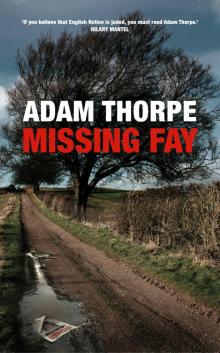 Missing Fay
Missing Fay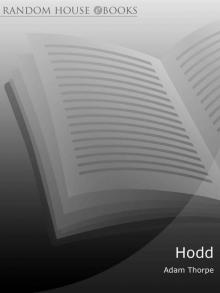 Hodd
Hodd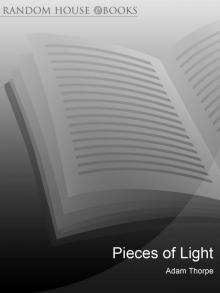 Pieces of Light
Pieces of Light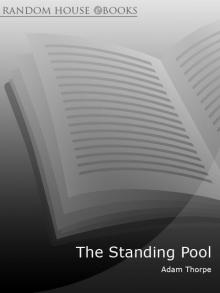 The Standing Pool
The Standing Pool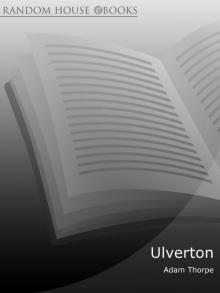 Ulverton
Ulverton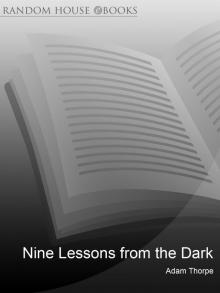 Nine Lessons From the Dark
Nine Lessons From the Dark Flight
Flight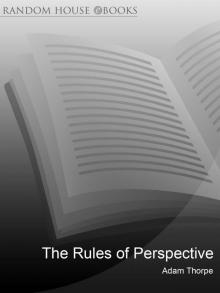 The Rules of Perspective
The Rules of Perspective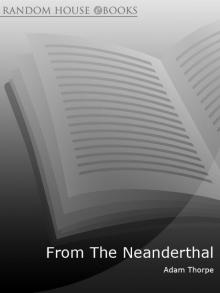 From the Neanderthal
From the Neanderthal Is This the Way You Said?
Is This the Way You Said?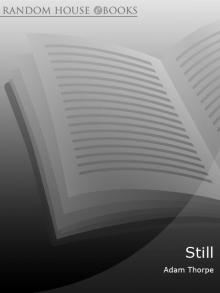 Still
Still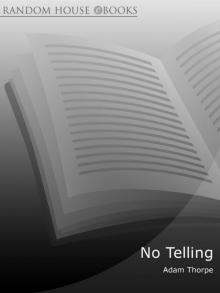 No Telling
No Telling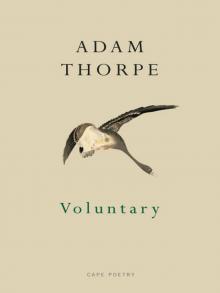 Voluntary
Voluntary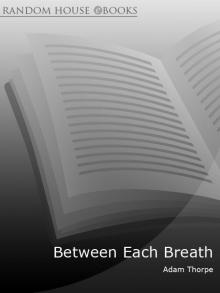 Between Each Breath
Between Each Breath